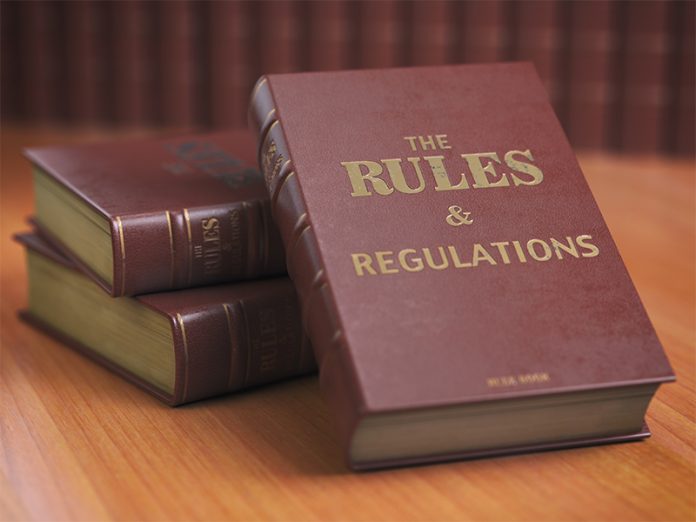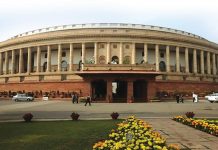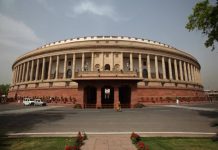This article is written by Ojasvi Gupta, a student of Law School, Banaras Hindu University, Varanasi. It investigates Rule 267 of the Rajya Sabha and throws light on why this single rule has been in the recent headlines.
Table of Contents
Introduction
The unique democratic setup of India is based primarily on institutional schemes provided by the Constitution of India and accompanying judicial developments. Along with these, there are provisions, however minor, which promote the concept of democracy in letter and spirit. Rule 267 of the Council of States is one such way by which the aim of a democratic, socialist and secular country is accounted for. Let’s see what this Rule is about and its relevance in the current scenario.
Rules of Rajya Sabha
The Rules of Procedure and Conduct of Business in the Rajya Sabha (Council of States) were adopted by the Upper House for regulating the general procedure carried therein on June 2, 1964, and these Rules have been effective from July 1, 1964, to the present. Till now, 9 editions of the Rules have been incorporated and include the amendments suggested by the Committee of Rules and implemented by the House.
These Rules are formulated under Article 118 (1) of the Indian Constitution. This provision empowers each House of the Parliament to make rules for effectively regulating its conduct of business. The importance of these Rules does not end with helping in the proper functioning of the House. They define the numerous parliamentary terms, mode of election of Deputy Chairman, the format of discussions on bills, and the constitution and functions of Committees involved. Similar to most of the Rules, they are essential for providing effective structure to the functions of the legislative house.
What is Rule 267
Rule 267 is used in situations when the members want to raise urgent issues and are unable to do so through the general procedures. Usually, a discussion on a matter of public interest is taken up by the House on a motion consented to by the Chairman through Rules 167-174. Our leaders envisaged a way to ensure that pressing matters are voiced out, especially in cases the urgency of the issue doesn’t allow for the delay that discussing it would make. Rule 267 of the Rules of Procedures and Conduct of Business in the Council of States provides for raising urgent issues of public importance by suspending the normal operation of Rules.
It states that the business of the day can be set aside to take up a discussion that is critical at the moment. Utilizing this provision any member of the House can move a motion for suspending any Rule in its application related to the business listed before the House for that day after the Chairman consents to such a proposal. Only the Chairman, i.e. the Vice President has the power to allow the motion for suspension of Rules, and the House decides whether a particular rule should be suspended or not.
To raise a motion under this Rule, the concerned Member must give notice to the Secretary-General of the House before 10 a.m. on the day on which suspension of business is sought. This notice includes the matter of public importance which needs to be raised because of its urgent nature and must be submitted after the last sitting day has been adjourned.
Such a provision is capable of drawing the attention of the government as well as the public to an issue that is integral to the society and the state but its urgent nature does not allow it to be dealt with in the usual and proper way of resolutions. If and when the Chairman approves this motion, the member introduces it with a brief statement emphasizing its critical nature, and the motion is put to vote. The majority voting determines whether the motion will be adopted and the listed business would be suspended for the day or it will be rejected.
Exception to Rule 267
The proviso to the Rule states that it can only be applied in situations where particular provisions for suspending the Rules under a certain Chapter are not mentioned. Thus, applications of this Rule are limited to generic instances.
Lok Sabha procedure similar to Rule 267
Parallel to Rule 267 of the Upper House is the adjournment motion of the Lok Sabha or the Lower House. Adjournment Motions of the Lok Sabha are governed by Rules 56—63 of the Rules of Procedure and Conduct of Business in Lok Sabha and Direction 2 (vi) of Directions by the Speaker. Adjournment Motion provides for a discussion on an urgent matter of public importance in the Lok Sabha by setting aside the normal business. This motion can be raised after the Speaker consents to it, depending upon the urgency of the matter.
Rule 388 in the Lok Sabha manual also provides for a motion for suspension of rules with the consent of the Speaker, however, to register its censure of the Union government, Lok Sabha MPs normally take recourse to the adjournment motion. The last adjournment motion was made in August 2015 regarding the alleged role of then Foreign Minister Sushma Swaraj in getting travel papers for Lalit Modi, a fugitive whose passport had been revoked.
How has Rule 267 gained attention
This prerogative of the opposition has been gaining attention in the media due to increasing attempts by the members to raise various issues in the recent past. Many of the members have stated outside the Parliament about their futile attempts at raising issues that the current government does not want to highlight or discuss. The Chairperson of the Rajya Sabha has received 10-15 notices for this Rule, to discuss agrarian, pegasus, Mizoram border issues and such in the last session, with none of them getting approval to be discussed.
The Parliament as a temple of democracy is a place where leaders are supposed to rise above party politics and discuss the issues that warrant their attention as legislators but the recent disruptions in the Parliament have not been able to achieve that goal. Protests by opposition members pressing for a discussion on the alleged use of Pegasus spyware by the central government and farmers’ agitation against agriculture reform laws have repeatedly disrupted proceedings in Rajya Sabha. Chairman M. Venkaiah Naidu reasoned that he has not accepted the notices given by various opposition party members under Rule 267 for suspension of the business to allow discussion on their respective issues as the Rule has rare use only. He had stated, in as early as March this year, that this often cited Rule by opposition members, should be used on rare occasions only, otherwise, the House won’t be able to function. He compared it to a ‘Brahmastra’ as opposed to other ‘astras’ or regular weapons and said that it must be invoked in extreme situations which are of a pressing nature.
Among a dozen of the members who had given notices under this Rule was Sukhendu Sekhar Ray of the Trinamool Congress who complained that no notice under Rule 267 has been accepted since November 2016, a period of 5 years while trying to discuss and debate on a matter that could be violating the Right to Privacy of the individuals at large. Congress MP KC Venugopal had given a notice under Rule 267 in Rajya Sabha to suspend the business and discuss the rise in the price of fuel, a burning topic nowadays, and other essential commodities. Dr. V Sivadasan and Elamaram Kareem of the Communist Party of India had also given a suspension of business notice under Rule 267 to give an adequate platform for discussing the farmers’ protest. Tiruchi Siva, MP from Dravidian Progressive Federation, DMK attempted to suspend the rules by giving the notice to discuss the Mekedatu Dam issue in the Upper House. Some other members’ names who have put in their notices unsuccessfully are Ravi Prakash Verma, Rajeev Gowda, and TK Rangarajan.
Notices under Rule 267 in the past
Although the frequency of requests to invoke this Rule has increased lately, the denial to grant such requests is not a new thing and has happened in the past as well. These requests are usually not accepted by the Chairman with few exceptions as evident in 2015 and 2016. The current Vice President has not allowed any discussion to be taken up by the members through Rule 267 since 2017, the year he chaired the House.
The last time motion under this Rule was granted by the former Vice President Hamid Ansari, it was for a discussion in November 2016 – the issue in question being demonetization. Before that, the issue was related to the need for agricultural reforms. If one bothers to count the rejected notices under his chairmanship, the list goes in hundreds with topics like GST, Rafale deal, Kashmir issue, being included several times. More specific issues include engineered defections to dislodge elected state governments, violence against medical professionals in hospitals and clinics.
Since the acceptance or rejection depends entirely on the Chairman’s discretion, there’s nothing else a member can do. Sometimes, it is obvious that the topic of the issue raised is just a political agenda rather than a sincere concern. For example, once an MP from Shiv Sena gave notice over the delayed production of the Vande Bharat Express train.
Conclusion
Ultimately, the main reason why this Rule has been attracting the attention of the political world is the gap of five years in its invocation. This was bound to raise some eyebrows as in the last years there had been various socio-political issues that have a significant impact on the country or a community, especially the problems during the pandemic. Following the rarest of the rare rule would render the implication of this Rule pretty unsatisfactory.
Meanwhile, the proper functioning of the House demands that not every notice be taken into consideration. It is for this reason that former Chairman P J Kurien has stated the need for a regulatory clause within the Rule itself. According to a source, the rules review committee set up by the Chairman has recommended in its interim report to amend Rule 267. From time to time, there have been instances that show inadequaṭe use of the above-mentioned Rule. In 2004, the ruling party had raised a motion under Rule 267 to suspend the question hour provided by Rule 38. Fali S. Nariman, then a member, had opposed the motion stating that the suspension of the important business of Question Hour is an attempt to prevent this House from functioning. The Rajya Sabha has been facing disruptions for quite a time now, and future use of this Rule, if unamended, may not be in the best interest of Indian democracy.
References
- General rules of procedure
- https://www.jagranjosh.com/current-affairs/rule-267-what-is-rule-267-in-rajya-sabha-when-was-it-last-invoked-rajya-sabha-chairperson-1627904617-1
- Explained | What is Rajya Sabha’s Rule 267?
- Panel for automatic suspension in Rajya Sabha
Students of Lawsikho courses regularly produce writing assignments and work on practical exercises as a part of their coursework and develop themselves in real-life practical skills.
LawSikho has created a telegram group for exchanging legal knowledge, referrals, and various opportunities. You can click on this link and join:
https://t.me/joinchat/L9vr7LmS9pJjYTQ9
Follow us on Instagram and subscribe to our YouTube channel for more amazing legal content.
 Serato DJ Crack 2025Serato DJ PRO Crack
Serato DJ Crack 2025Serato DJ PRO Crack











 Allow notifications
Allow notifications


